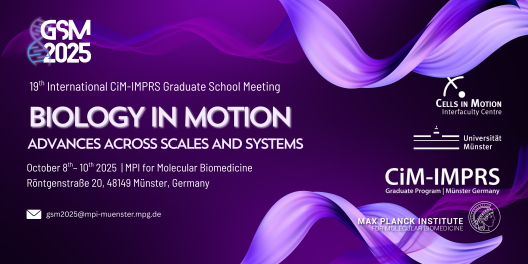
18th INTERNATIONAL CiM-IMPRS GRADUATE SCHOOL MEETING, Münster/Germany
8 - 10 October, 2025

12:45 - 13:00 (Zoom) Registration
| COMPUTATIONAL BIOLOGY | |
| 13:00 - 13:10 | Welcoming online |
| 13:10 - 13:50 | KEYNOTE: Decoding cellular systems: From observational atlases to generative interventions Fabian Theis, Helmholtz Zentrum München, Germany |
| 13:50 - 14:20 | Enabling non-invasive, long-term observation of cellular processes via label-free live imaging and in silico labeling Assaf Zaritsky, Ben-Gurion University of the Negev, Be'er-Sheva, Israel |
| 14:20 - 14:50 | How Cells Steer Themselves: Finding Infections, Building Embryos, Solving Mazes Robert Insall, University College London, GB |
14:50 - 16:05 Break
| ALUMNI & SPONSORS | |
| 16:05 - 16:35 | Role of Medical Liaison Management in the Pharmaceutical Industrie - Taking on Opportunities and Challenges Nina Andreas, AstraZeneca, Hamburg, Germany |
| 16:35 - 17:05 | Processes, Innovations, Communication: The R&D perspective in an IVD Company Binyamin Düthorn, altona Diagnostics, Hamburg, Germany |
| 17:05 - 17:35 | Turning scientific expertise into corporate strategic Impact Gloria Mancinelli, German Center for Neurodegenerative Diseases, Bonn, Germany |
| 17:35 - 17:45 | Sponsors |
| 17:45 - 18:00 | Poster Introductions |
8:30 - 9:00 Registration
9:00 - 9:10 Welcoming
| DEVELOPMENT I | |
| 9:10 - 9:40 | Mechanics of avian Gastrulation Jérôme Gros, University of Marseille-Luminy in France, Marseille, France |
| 9:40 - 10:10 | High-resolution imaging across scales with modular and portable light sheet microscopy Jan Huisken, Georg-August-University Göttingen, Germany |
| 10:10 - 10:50 | Neural Crest: The Great Invaders of the Embryo Roberto Mayor, University College London, GB |
10:50 - 11:10 Coffee Break
| DEVELOPMENT II | |
| 11:10 - 11:40 | The Fish that Heals: Unraveling the Mysteries of Cardiac Regeneration Jeroen Bakkers, Hubrecht Institut, Utrecht, NL |
| 11:40 - 12:10 | The spark of life. Initiating transcription in embryos. Nadine Vastenhouw, University of Lausanne (UNIL), Switzerland |
| 12:10 - 12:50 | Cellular Roadmaps: Control of microtubule organization and Dynamics Anna Akhmanova, Utrecht University, NL |
13:00 - 14:00 Lunch
| NEUROBIOLOGY | |
| 14:00 - 14:30 | Single-neuron Mechanisms for Spatial Memory in Humans Lukas Kunz, Universität Bonn, Germany |
| 14:30 - 15:00 | Unleashing hidden visual potential through olfactory deprivation in Drosophila Büşra Çoban, Friedrich Miescher Institute, Basel, Switzerland |
| 15:00 - 15:40 | Extracellular vesicles in neuron-glia communication and CNS homeostasis Eva-Maria Krämer-Albers, Johannes Gutenberg-Universität Mainz, Germany |
15:40 - 17:00 Coffee and Poster session 1
| CELL BIOLOGY (MIGRATION) | |
| 17:00 - 17:30 | Leukocyte migration under confinement: From cell biology to therapeutics Pablo Vargas, Institut Necker Enfants Malades - Équipe Vargas, Paris, France |
| 17:30 - 18:00 | Leukocyte navigation in complex Environments Michael Sixt, Institute of Science and Technology Austria (ISTA), Klosterneuburg, Österreich |
18:00 - 20:00 Social Event
8:30 - 9:00 Registration
| YOUNG INVESTIGATORS | |
| 9:00 - 9:20 | Does dosage matter? Quantitative control of cell fate determination during human Gastrulation Theresa Groß-Thebing, University of Cambridge, GB |
| 9:20 - 9:40 | Structural insights into actin filament Regulation Micaela Boiero Sanders, MPI für molekulare Physiologie, Dortmund, Germany |
| 9:40 - 10:00 | Biophysical mechanisms of neuronal membrane shape Regulation Agata Witkowska, The Leibniz-Forschungsinstitut für Molekulare Pharmakologie (FMP), Berlin, Germany |
10:00 - 10:20 Coffee Break
| CELL BIOLOGY (VASCULAR) | |
| 10:20 - 11:00 | KEYNOTE: Endothelial Dynamics in Vascular Patterning - A Tale of Fish and Chips Holger Gerhardt, Max-Delbrück-Centrum für Molekulare Medizin (MDC), Berlin, Germay |
| 11:00 - 11:30 | The vasculature as a target for therapy in Glioblastoma Anna Dimberg, Uppsala University, Uppsala, Sweden |
| 11:30 - 12:00 | Unraveling Vascular Biology with Ratiometric Single-Cell Functional Genetics Rui Benedito, Max-Planck-Institute für molekulare Biomedizin, Münster, Germany |
12:00 - 13:30 Poster session 2 and Lunch
| ADVANCED METHODS | |
| 13:30 - 14:00 | Cryo‑EM snapshots of vesicular transport from test‑tube to cell Oleksiy Kovtun, Max-Planck-Institut für Multidisziplinäre Naturwissenschaften, Göttingen, Germany |
| 14:00 - 14:40 | Physiologically-based pharmacokinetic modeling in health and disease Lars Kuepfer, Uniklinik RWTH Aachen, Germany |
14:40 - 14:55 Awards and Feedback
14:55 - 15:10 Poster Award
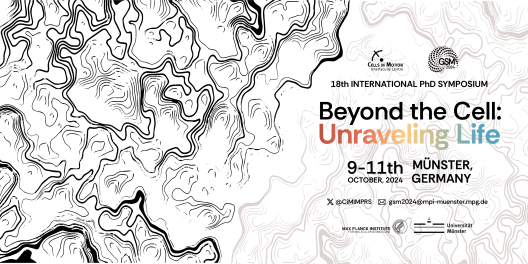
12:00 - 12:50 Registration
| IMMUNOLOGY | |
|---|---|
| 12:50-13:00 | Welcome talk |
| 13:00-13:40 | Role of microRNAs in fine-tuning the inflammatory response Mostafa Chamekh, Inflammation Unit, Laboratory of Pediatric Research and ULB Center for Research in Immunology (U-CRI), Faculty of Medicine, Brussels, Belgium |
| 13:40-14:20 | Olfactory receptor 2 as novel mediator of cardio-vascular inflammation Holger Winkels, Heart Center, Department of Cardiology, Faculty of Medicine and University Hospital Cologne, University of Cologne, Cologne, Germany |
| 14:20-15:20 | Tissue Macrophage Heterogeneity Florent Ginhoux, Agency for Science, Technology and Research (A*STAR), Singapore, Singapore |
15:20 - 16:00 Coffee break
| VASCULAR BIOLOGY | |
|---|---|
| 16:00-16:40 | Angiogenesis revisited: exploring novel endothelial cell regulators and their therapeutic potential Anna Rita Cantelmo, Institut Pasteur de Lille, INSERM U1011-EGID, University of Lille, Lille, France |
| 16:40-17:20 | The neurovascular interface in health and disease Isabelle Brunet, Center for Interdisciplinary Research in Biology (CIRB), Collège de France, Paris, France |
| 17:20-18:00 | Vascular dysfunction in cardiometabolic diseases Joanna Kalucka, Department of Biomedicine, Aarhus University, Aarhus, Denmark |
| 18:00-18:15 | Poster talks |
18:15 - 19:30 Dinner & Poster session
19:30 - 21:00 Social activity - Pub Quiz
9:00 - 9:50 Registration
| DEVELOPMENT I | |
|---|---|
| 9:50-10:00 | Welcome talk |
| 10:00-10:40 | Towards a single-molecule perspective of nuclear dynamics in the mammalian embryo Srinjan Basu, Wellcome-MRC Cambridge Stem Cell Institute, Jeffrey Cheah Biomedical Centre, Cambridge, UK |
| 10:40-11:20 | RNA folding limits intermolecular base pairing in germ granules and maintains normal mRNA function and fly development Tatjana Trcek, Department of Biology, Johns Hopkins University, Baltimore, USA |
| 11:20-11:40 | Sponsor talks |
11:40 - 12:00 Coffee break
| DEVELOPMENT II | |
|---|---|
| 12:00-13:00 | Reconstructing development Alexander Schier, Biozentrum, University of Basel, Basel, Switzerland |
13:00 - 14:30 Lunch & Poster session
| NEUROSCIENCE | |
|---|---|
| 14:30-15:10 | Mechanisms of axon growth and regeneration Frank Bradke, Laboratory for Axonal Growth and Regeneration, German Center for Neurodegenerative Diseases (DZNE), Bonn, Germany |
| 15:10-15:50 | Voltage imaging: Development and Applications Daan Brinks, Department of Imaging Physics, Delft University of Technology, Delft, The Netherlands |
| 15:50-16:30 | How cell-cell interactions shape brain development Carla Sofia Gomes da Silva, Department of Translational Neuroscience, UMC Brain Center, University Medical Center Utrecht, Utrecht University, Utrecht, The Netherlands |
16:30 - 17:00 Coffee break
17:00 - 19:00 CiM-IMPRS 15 Years Celebration
8:40 - 9:20 Registration
| Young investigators | |
|---|---|
| 9:20-9:30 | Welcome talk |
| 9:30-9:50 | Young investigator talk: Sensing endogenous nesprin-2 force transduction and its involvement in cytoskeletal mechanics Tanmay Sadhanasatish, University of Münster, Institute of Molecular Cell Biology, Germany |
| 9:50-10:10 | Young investigator talk: MTSS1 regulates endothelial cell alignment in response to shear forces Christina Teubert, University of Münster, Institute of Medical Physics and Biophysics, Germany |
| 10:10-10:30 | Young investigator talk: The actin cytoskeleton at different stages of plasma membrane repair Rafaella Jekabson, University of Münster, Institute of Cell Dynamics and Imaging, Germany |
10:30 - 10:50 Coffee break
| BIOPHYSICS | |
|---|---|
| 10:50-11:30 | More than the sum: how a composite interface governs function Alba Diz-Muñoz, Cell Biology and Biophysics Unit, European Molecular Biology Laboratory (EMBL), Heidelberg, Germany |
| 11:30-12:10 | Mechanobiology of the ECM and its regulation of tissue function Kevin Chalut, Altos Labs, Cambridge Institute of Science, Cambridge, UK |
12:10 - 13:00 Lunch Break
| ALUMNI I | |
|---|---|
| 13:00-13:30 | Apelin signaling in the cardiovascular system Christian Helker, Faculty of Biology, Cell Signaling and Dynamics, Philipps-University Marburg, Marburg, Germany |
| 13:30-14:00 | Mesoscale epithelial mechanobiology and cellular interfaces Jacopo di Russo, RWTH Aachen University, Aachen, Germany |
| 14:00-14:30 | A journey to the dark side of the genome Rocio Enriquez-Gasca, The Francis Crick Institute, London, UK |
14:30 - 15:00 Coffee Break
| ALUMNI II | |
|---|---|
| 15:00-15:30 | Co-founder and CEO at Cambrium Mitchell Duffy, Berlin, Germany |
| 15:30-16:00 | Scientist at BLUU Seafood Niraimathi Govindasamy, Hamburg, Germany |
| 16:00-16:30 | Scientist at Roche Jyoti Rao, Basel, Switzerland |
| 16:30-17:00 | Awards and closing ceremony |
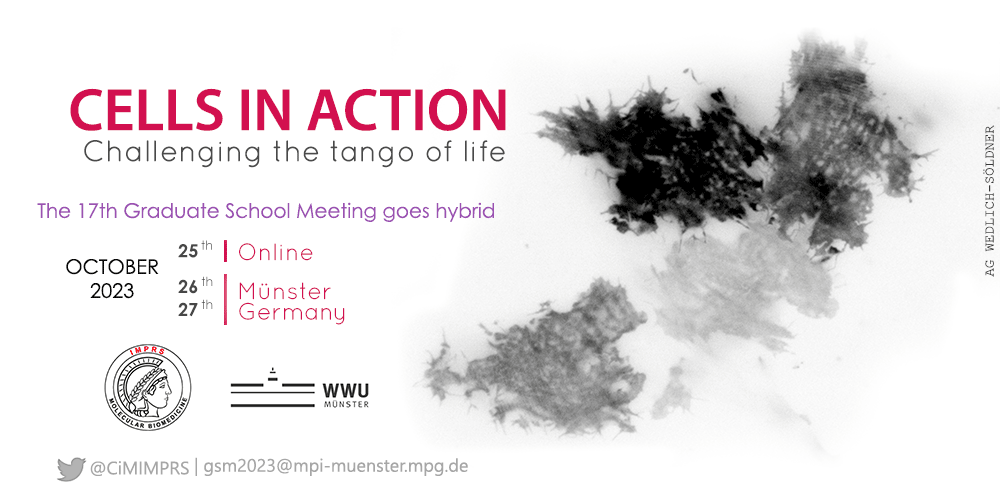
9:00-9:10 Welcome Talk
9:10-10:50 Development and Cell Biology Part I
|
TIME |
TOPICS AND SPEAKERS |
|---|---|
|
9:10-9:50 |
Impact of lamin-A/C on cancer progression in vivo |
|
9:50-10:30 |
A question of dynamics |
|
10:30-10:50 |
Q&A and Coffee Break |
10:50-12:50 Vascular Biology
|
10:50-11:30 |
Guiding Mechanotransduction in Blood Vessels |
|
11:30-12:10 |
Skeletal stem/progenitor cells: interactions within the bone vascular microenvironment and beyond |
|
12:10-12:50 |
Leukocyte breaching of blood vessel walls: Insights into the role of pericytes |
12:50-14:00 Lunch Break
14:00-15:50 Developmental & Cell Biology Part II
|
14:00-14:40 |
Membrane repair mechanisms and membrane integrity |
|
14:40-15:20 |
Cellular roadmaps: Control of cell architecture by dynamic microtubules |
|
15:20-15:50 |
Q&A and Coffee Break |
15:50-17:50 Immunology & Virology
|
15:50-16:30 |
Unraveling the Molecular Architecture of the Intestinal Barrier: Insights from Spatial Transcriptomics |
|
16:30-17:10 |
Circadian control of enteric virus infection |
|
17:10-17:50 |
Culturing Hepatitis E Virus– recent advances for basic science and drug discovery |
8:00-8:50 Registration
8:50-9:00 Welcome Talk
|
TIME |
TOPICS AND SPEAKERS |
|---|---|
|
9:00-9:20 |
Young investigator talk: Double-modified AdoMet analogues for selective targeting of methyltransferases |
|
9:20-9:40 |
Young investigator talk:Two-way Dispatched function in Sonic Hedgehog shedding and transfer to high-density lipoproteins |
|
9:40-10:00 |
Young investigator talk: Unexpected function of the antioxidative xCT system/Slc7a11 in systemic sclerosis |
|
10:00-10:30 |
Poster Flash Talks |
|
10:30-10:50 |
Q&A and Coffee Break |
10:50-12:00 Non-academic Session
|
10:50-12:00 |
Career Seminar |
12:00-13:30 Lunch Break and Poster Session
13:30-16:30 Systems Biology
|
13:30-14:10 |
Mitotic rewiring on evolutionary timescales |
|
14:10-14:50 |
Cellular regulation in context – Integration of mathematical modeling in time and space with dedicated experiments on different scales |
|
14:50-15:30 |
The EGFR/RPTPg sensory morphogenic system: a loop onto itself |
|
15:30-16:10 |
From molecules to life: building living systems from scratch |
|
16:10-16:30 |
Q&A and Coffee Break |
16:30-17:50 Biophysics Part I
|
16:30-17:10 |
|
|
17:10-17:50 |
Modulation of the Slo potassium channel by small molecules and auxiliary proteins |
18:00 onwards Social Event: Get together & Pub Quiz
9:45-10:00 Registration
10:00-10:10 Welcome Talk
10:10-14:40 Neuroscience
|
TIME |
TOPICS AND SPEAKERS |
|---|---|
|
10:10-10:50 |
Interactions of Tau protein condensates |
|
10:50-11:30 |
Programming cell fate and age for neuronal disease modeling and repair |
|
11:30-12:30 |
KEYNOTE: Synaptic vesicles – key organelles in synaptic transmission |
12:30-14:00 Poster Sessions and Lunch Break
|
14:00-14:40 |
Single-cell delineation of lineage and genetic identity in the mouse brain |
14:40-16:00 Biophysics Part II
|
14:40-15:20 |
Cytoskeletal fibres as building blocks for life |
|
15:20-16:00 |
Cellular cartography: mapping cytoskeletal organization and intracellular transport in neurons |
16:00-16:30 Poster Awards & Closing Ceremony
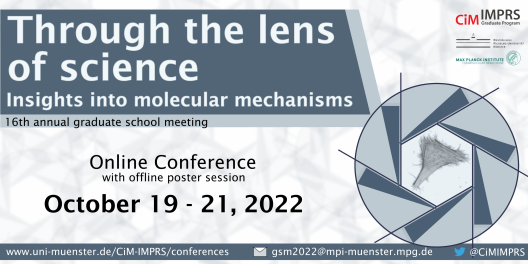
9:00-9:30 Welcome talk
9:30-12:45 Session: Development and Regeneration
| Time | Topics and speakers |
|---|---|
| 9:30-10:30 | KEYNOTE: Coping with mechanical stress: tissue dynamics during development, homeostasis and repair Yanlan Mao, Laboratory for Molecular Cell Biology, University College London, London, UK |
| 10:30-11:00 | Deep learning in developmental biology Patrick Müller, Chair of Developmental Biology at the University of Konstanz, Konstanz, Germany |
| 11:00-11:30 | Q&A and coffee break |
| 11:30-12:00 |
Young investigator talk: Early endosomes act as local exocytosis hubs to repair endothelial membrane damage |
| 12:00-12:30 | How to engineer human pluripotent stem cells to understand human development and disease Nuria Monteserrat, Institute of Bioengineering of Catalonia (IBEC), Barcelona, Spain |
| 12:30-12:45 | Q&A |
| 13:30-14:30 | KEYNOTE: Me and my Markov blanket: Sentience and the Free Energy Principle Karl Friston, Institute of Neurology, University College London, London, UK |
| 14:30-15:00 | Mechanisms of Axon Growth and Regeneration Frank Bradke, DZNE, Bonn, Germany |
| 15:00-15:30 | Q&A and coffee break |
| 15:30-16:00 | Young investigator talk: Synaptic retrograde regulation of the PKA-induced SNAP-25 and Synapsin-1 phosphorylation Aleksandra Polishchuk, Rovira i Virgili University, Spain |
| 16:00-16:30 | The CeNGEN project: neurogenomics at single-cell resolution across an entire nervous system Marc Hammarlund, Yale School of Medicine, New Haven, USA |
| 16:30-16:45 | Q&A |
| 17:45-18:15 | Julia Eckhoff, freelance medical writer (Eckcomms Ltd), former Nature Communications editor, London, UK |
| 18:15-18:45 | Michael Spiegelmacher, BionautLabs, Los Angeles, CA, USA |
| Time | Topics and speakers |
|---|---|
| 9:00-10:00 | KEYNOTE: Neutrophil breaching of venular walls: Novel concepts and pathophysiological regulation Sussan Nourshargh, Queen Mary University of London, London, UK |
| 10:00-10:30 | How leukocytes breach the vessel wall: Searching for the ideal transmigration hotspot Jaap van Buul, Swammerdam Institute for Life Sciences (SILS) at University of Amsterdam, Amsterdam, the Netherlands |
| 10:30-11:00 | Q&A and coffee break |
| 11:00-11:30 | Young investigator talk: The role of nuclear envelope structure in response to shear stress in Endothelial cells Parisa Ghanbari, Department of Vascular Cell Biology, Max Planck Institute for Molecular Biomedicine, Münster, Germany |
| 11:30-12:00 | Young investigator talk: The effect of hydrogen peroxide on the permeability of the blood-brain barrier in vitro Margarita Shuvalova, Shemyakin-Ovchinnikov Institute of Bioorganic Chemistry, RAS, Moscow, Russia |
| 12:00-12:15 | Q&A |
| Time | Topics and speakers |
|---|---|
| 14:15-15:15 | KEYNOTE: Synthetic metal complexes for in-cell catalysis Peter Sadler, Department of Chemistry, University of Warwick, Coventry, UK |
| 15:15-15:45 | Learning from viruses for EV functionalization Kenneth Witwer, John Hopkins University School of Medicine, Baltimore, USA |
| 15:45-16:15 | Q&A and coffee break |
| 16:15-16:45 | Junctional mechanotransduction in angiogenesis Stephan Huveneers, Amsterdam UMC, University of Amsterdam, Amsterdam, the Netherlands |
| 16:45-17:15 | SARS-CoV-2 adaptation to effective transmission and its replication in airway epithelia Raul Andino, UCSF, San Francisco, USA |
| 17:15-17:30 | Q&A |
| Time | Topics and speakers |
|---|---|
| 9:00-09:30 | Generative models of brain function: Inference, mechanisms, and psychedelics Adeel Razi, Institute for Brain and Mental Health, the School of Psychological Sciences, Monash University, Melbourne, Australia |
| 9:30-10:00 | Formatting Biological Big Data to Enable (Personalized) Systems Pharmacology Patrick Aloy, Structural Bioinformatics and Network Biology, IRB, Barcelona, Spain |
| 10:00-10:30 | Solving 3D puzzles of biomolecular assemblies by integrative modelling Alexandre Bonvin, Bijvoet Center for Biomolecular Research, Utrecht University, Utrecht, Netherlands |
| 10:30-11:00 | Q&A and coffee break |
| 11:00-11:30 | Controlling receptor activity with photoswitchable drugs: basic research and future therapies Pau Gorostiza, ICREA, BIST, CIBER, IBEC, Barcelona, Spain |
| 11:30-12:00 | How to Quantify A Zebrafish: Research Software for Image-Driven Biomedical Studies Elisabeth Kugler, University College London, London, UK |
| 12:00-12:15 | Q&A |
| 12:15-14:00 | Lunch break & poster session |
| 14:00-15:00 | KEYNOTE: Advanced optical microscopy studies of molecular membrane organizations Christian Eggeling, Friedrich-Schiller Universität Jena, Jena, Germany |
| 15:00-15:30 |
Young investigator talk: CryoEM structure of the peroxisomal AAA-complex Pex1/Pex6 processing a substrate |
| 15:30-16:00 | Q&A and coffee break |
| Time | Topics and speakers |
|---|---|
| 16:00-16:30 | Lipid transport at contact sites by tube-forming lipid transport proteins William Prinz, National Institute of Diabetes and Digestive and Kidney Diseases NIH, Bethesda, Maryland, USA |
| 16:30-17:00 | Dissecting the biophysical phase properties of cellular lipid storage Mike Henne, Department of Cell Biology, UTSW Medical Center, UT Southwestern, Dallas, USA |
| 17:00-17:15 | Q&A |
| 17:15-17:30 | Poster awards & Closing ceremony |
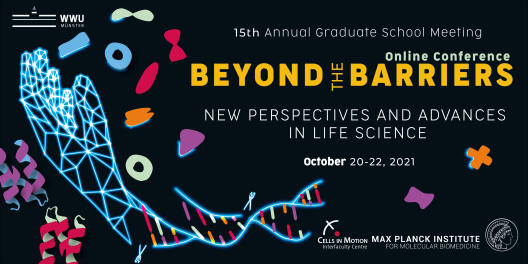
13:00-13:30 Welcome
13:30-17:30 Session: cell & molecular biology
| Time | Topics and speakers |
|---|---|
| 13:30-14:30 | Keynote: The systemic vasculature as guardian of health and longevity Hellmut Augustin, Vascular Biology and Tumor Angiogenesis, Medical Faculty Mannheim of Heidelberg University, Mannheim, Germany |
| 14:30-15:00 | Modeling human brain disorders in vitro with patient-derived induced pluripotent stem cells Cedric Bardy, Laboratory for Human Neurophysiology and Genetics, South Australian Health and Medical Research Institute, Adelaide, Australia |
| 15:00-15:30 | Q&A |
| 15:30-16:00 | Heterogeneity of myeloid cells in the brain Marco Prinz, Institute of Neuropathology, University Hospital Freiburg, Freiburg, Germany |
| 16:00-16:30 | Metabolic guidance of vascular growth and differentiation Michael Potente, Angiogenesis & Metabolism Laboratory, Max Planck Institute for Heart and Lung Research, Bad Nauheim, Germany |
| 16:30-17:00 | Young investigator talk: Deciphering the role of Nicastrin in the egress of influenza A virus Swathi Sukumar, Center for Molecular Biology of Inflammation (ZMBE) Institute of Virology with Prof. Stefan Ludwig, University of Münster, Münster, Germany |
| 17:00-17:30 | Q&A |
10:00-11:45 Session: cell metabolism 1
| Time | Topics and speakers |
|---|---|
| 10:00-10:30 | Mechanisms of hepatocyte polarization and liver tissue morphogenesis Marino Zerial, Max Planck Institute of Molecular Cell Biology and Genetics, Dresden, Germany |
| 10:30-11:00 | Keeping the good ones: intracellular selection of mitochondrial DNA Christof Osman, Cell and Developmental Biology, Ludwig-Maximilians-Universität (LMU) Munich, Munich, Germany |
| 11:00-11:30 | Young investigator talk: CHIMs - A class of versatile cholesterol analogs with unique properties Anna Lívia Linard Matos, Center for Molecular Biology of Inflammation (ZMBE) Institute of Medical Biochemistry with Prof. Volker Gerke, Münster, Germany |
| 11:30-11:45 | Q&A |
11:45-12:30 Lunch break
12:30-13:00 Poster session
13:00-15:00 Session: cell metabolism 2
| Time | Topics and speakers |
|---|---|
| 13:00-14:00 | Keynote: Molecular architecture as a critical determinant of metabolism Gökhan S. Hotamisligil, Sabri Ülker Center, Harvard T.H. Chan School of Public Health, Harvard University, Boston, USA |
| 14:00-14:30 | The impact of adipose tissues in cancer cells and macrophage immunometabolism Kelly Grace Magalhães, Laboratory of Immunology and Inflammation, Departament of Cell Biology, University of Brasilia, Brasilia, Brasil |
| 14:30-15:00 | Q&A |
15:00-19:00 Session: cell architecture visualization
| Time | Topics and speakers |
|---|---|
| 15:00-16:00 | Keynote: Light, CRISPR and DNA repair Taekjip Ha, Johns Hopkins School of Medicine, Johns Hopkins University, Baltimore, USA |
| 16:00-16:30 | Young investigator talk: Potential neuroprotective, immunomodulatory and antiviral effects of omega-3 (DHA) in neuronal and microglial ZIKV infection Heloísa Antoniella Braz de Melo, Laboratory of Immunology and Inflammation – University of Brasília (UnB) |
| 16:30-17:00 | Q&A |
| 17:00-17:30 | Cryo-ET reveals sarcomere structures at molecular resolution Stefan Raunser, Structural Biochemistry, Max Planck Institute of Molecular Physiology, Dortmund, Germany |
| 17:30-18:00 | Power at the nanoscale: speed, strength and efficiency in biological motors Carlos Bustamante, Single Molecule Biophysics, University of California, Berkeley, USA |
| 18:00-18:30 | Mechano-genomics of cell-state transitions G.V. Shivashankar, Department of Health Sciences and Technology, Swiss Federal Institute of Technology Zurich, Zurich, Switzerland |
| 18:30-19:00 | Q&A |
09:00-12:45 Session: tissue engineering
| Time | Topics and speakers |
|---|---|
| 09:00-10:00 | Keynote: Organoids to model human disease Hans Clevers, Hubrecht Institute for Developmental Biology and Stem Cell Research, Princess Máxima Center for Pedriatic Oncology, Utrecht, the Netherlands |
| 10:00-10:30 | Engineering organoids-on-a-chip Matthias Lutolf, Laboratory of Stem Cell Bioengineering, École Polytechnique Fédérale de Lausanne, Lausanne, Switzerland |
| 10:30-11:00 | Q&A |
| 11:00-11:30 | Engineering pancreas organogenesis: from self-organization to understanding diabetes Anne Grapin-Botton, Max Planck Institute of Molecular Cell Biology and Genetics, Dresden, Germany |
| 11:30-12:00 | Young investigator talk: The vertebrate RNA-binding protein Dead end controls the access of nanos RNA to ribosome-rich areas at the periphery of germ granules Kim Westerich, Center for Molecular Biology of Inflammation (ZMBE) Institute of Cell Biology with Prof. Erez Raz Münster, Germany |
| 12:00-12:30 | Tissue-specific vascular models – modelling human disease at the microscale Kristina Haase, Tissue Biology and Disease Modelling, European Molecular Biology Laboratory Barcelona, Barcelona, Spain |
| 12:30-12:45 | Q&A |
12:45-13:30 Lunch break
13:30-14:00 Poster session
14:00-17:30 Session: systems biology
| Time | Topics and speakers |
|---|---|
| 14:00-15:00 | Keynote: Synthetic biology: life redesigned James Collins, Massachusetts Institute of Technology, Massachusetts, USA |
| 15:00-15:30 | Image analysis and AI in microscopy-based life science research Carolina Wählby, Department of Information Technology, Uppsala University, Uppsala, Sweden |
| 15:30-16:00 | Q&A |
| 16:00-16:30 | Towards reconstructing petabyte-scale lightsheet microscopy acquisitions Stephan Preibisch, Janelia Research Campus, Howard Hughes Medical Institute, Ashburn, USA |
| 16:30-17:00 | Computational approaches for analysis of single-cell multi-modal data Laleh Haghverdi, Computational Methodologies and Omic Analytics, Max Delbrück Center for Molecular Medicine, Berlin, Germany |
| 17:00-17:15 | Q&A |
| 17:15-17:30 | Closing activities |
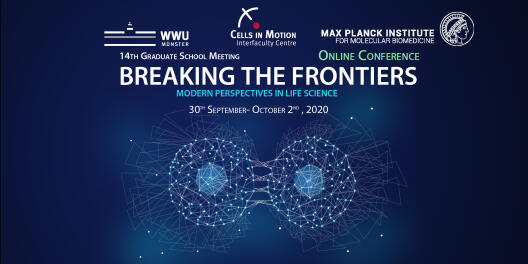
14:00-14:30 Welcome
14:30-19:00 Session 1 – Biology
| Time | Topics and speakers |
|---|---|
| 14:30-15:30 | Keynote: Molecular Mechanism of Cytokinesis Prof. Thomas D. Pollard, Department of Molecular Cellular and Developmental Biology, Yale University, USA |
| 15:30-16:00 | Blastoids – Blastocyst-like Structures Generated Solely From Stem Cells Dr. Nicolas Rivron, Austrian Academy of Sciences, IMBA - Institute of Molecular Biotechnology, Austria |
| 16:00-16:30 | Q&A Session & Coffee Break |
| 16:30-17:00 | Dynamizing Nuclear Actin Filaments in Cell Division Prof. Robert Grosse, Experimental and clinical pharmacology and toxicology, Freiburg University, Germany |
| 17:00-17:30 | Young Investigator Talk: Excluding Oct4 From Yamanaka Cocktail Unleashes the Developmental Potential of iPSCs Sergiy Velychko from Professor Dr. Hans R. Schöler's lab, Max Planck Institute for Molecular Biomedicine, Germany |
| 17:30-18:00 | Identifying Chromatin Regulators at Specific Genomic Loci Prof. Sylvia Erhardt, Center for Molecular Biology, Heidelberg University, Germany |
| 18:00-18:30 | Q&A Session |
| 18:30-19:00 | Closing Remarks for the Day |
09:00-13:00 Session 2 – Biology
| Time | Topics and speakers |
|---|---|
| 09:00-10:00 | Keynote: The Vascular Barrier – What We Know and Why It’s Important Prof. Lena Claesson-Welsh, Vascular Biology, Uppsala University, Sweden |
| 10:00-10:30 | Quantifying Material Properties of Living Matter and How These Relate to Biological Function Prof. Lene B Oddershede, Optical Tweezers Group, Niels Bohr Institute, University of Copenhagen, Denmark |
| 10:30-11:00 | Q&A Session & Coffee Break |
| 11:00-11:30 | Young Investigator Talk: Master Mitotic Kinases Regulate HPV16 Nuclear Delivery During Mitosis Matteo Rizzato from Prof. Dr. Mario Schelhaas's lab, Institute for Cellular Virology, Münster University, Germany |
| 11:00-11:30 | Young Investigator Talk: Master Mitotic Kinases Regulate HPV16 Nuclear Delivery During Mitosis Matteo Rizzato from Prof. Dr. Mario Schelhaas's lab, Institute for Cellular Virology, Münster University, Germany |
| 11:30-12:00 | Young Investigator Talk: PECAM-1 Mediates Leukocyte Diapedesis by Triggering Dephosphorylation of VE-Cadherin-Y731 Nida Arif from Prof. Dr. Dietmar Vestweber's lab, Max Planck Institute for Molecular Biomedicine, Germany |
| 12:00-12:30 | Tolerance to Aneuploidy Prof. René Medema, Cell division and Cancer, Netherlands Cancer Institute, Netherlands |
| 12:30-13:00 | Q&A Session |
13:00-14:00 Lunch Break
14:00-19:00 Session 3 – Biophysics
| Time | Topics and speakers |
|---|---|
| 14:00-15:00 | Keynote: Engineering 3D Cultures of Physiology and Disease – How Simple is Complex Enough? Prof. Christopher Chen, Tissue Microfabrication Lab, Boston University & Harvard University, USA |
| 15:00-15:30 | Young Investigator Talk: Synthetic Extracellular Matrices With Tailored Properties Support Lumen Formation During Angiogenic Sprouting Jifeng Liu from Dr. Britta Trappmann's lab, Max Planck Institute for Molecular Biomedicine, Germany |
| 15:30-16:00 | Active Cell Deformation Through Actin Assembly, and How We May Infer Nucleus Deformation Dr. Cécile Sykes, Institute Curie PSL Paris, Sorbonne University, France |
| 16:00-17:00 | Coffee Break & Poster Session |
| 17:00-17:30 | Intravascular Tracking of Tumor Metastasis Dr. Jacky Goetz, Lab for Tumor Biomechanics, INSERM Institut d’Hématologie et d’Immunologie Strasbourg, France |
| 17:30-18:00 | Deep Learning-Based Point-Scanning Super-Resolution Microscopy Prof. Uri Manor, Biophotonics Core Facility, Salk Institute for Biological Studies, USA |
| 18:00-18:30 | Q&A Session |
| 18:30-19:00 | Closing Remarks for the Day |
10:00-13:00 Session 4 – Biochemistry
| Time | Topics and speakers |
|---|---|
| 10:00-11:00 | Keynote: Synthetic Protobiology – The Chemistry of Life-like Objects Prof. Stephen Mann, Bristol Centre for Functional Nanomaterials, University of Bristol, UK |
| 11:00-11:30 | Spatiotemporal Control Over Adhesions in Synthetic Cells Using Light Prof. Seraphine Wegner, Institute for Physiological Chemistry and Pathobiochemistry, Münster University, Germany |
| 11:30-12:00 | Phthalocyanine-Based Photosensitizers and Their (Soft) Nanostructures for Photo-Antimicrobial Applications Dr. Anzhela Galstyan, Center for Soft Nanoscience, Münster University, Germany |
| 12:00-12:30 | Molecularly Engineered Nanobiomaterials to Understand and Control Biology Dr. Helena Azevedo, School of Engineering and Materials Science and Institute of Bioengineering, Queen Mary University of London, UK |
| 12:30-13:00 | Q&A Session |
13:00-14:00 Lunch Break
14:00-16:30 Session 5 – Bioinformatics/Mathematics
| Time | Topics and speakers |
|---|---|
| 14:00-14:30 | Prediction and Design of Biological Sequences with Neural Machines Prof. Debora Marks, Department of Systems Biology, Harvard Medical School, USA |
| 14:30-15:00 | Modeling Cellular Response in Time and Space Prof. Fabian Theis, Institute of Computational Biology, Helmholtz Zentrum München, Germany |
| 15:00-15:30 | Suggestions From Mathematics for the Functioning of Flatworm Regeneration Prof. Angela Stevens, Institute for Applied Mathematics: Analysis and Numerics, Münster University, Germany |
| 15:30-16:00 | Q&A Session |
| 16:00-16:30 | Final Closing Remarks |
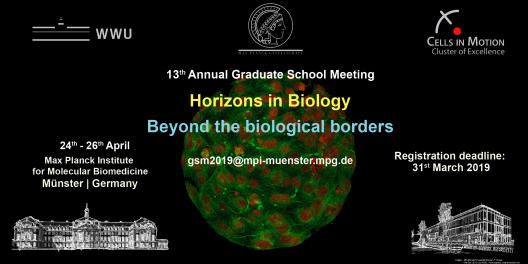
| 09:00 | Registration |
| 11:30 | Lunch |
| 12:15 | Opening remarks |
|
Morphogenesis session |
|
| 12:30 | Keynote: Phase segregation of ooplasm and yolk granules in zebrafish oocytes is mediated by periodic bulk actin polymerization waves Carl-Philipp Heisenberg, Klosterneuburg/Austria |
| 13:30 | Imaging How Cells Choose their Fate, Shape and Position to Form the Mammalian Embryo Nicolas Plachta, Singapore |
| 14:10 | Coffee break |
|
Morphogenesis session |
|
| 14:40 | Connections for vision Iris Salecker, London/UK |
| 15:20 | Investigating neuronal cell fate in vivo in the developing vertebrate retina Leanne Godinho, Munich/Germany |
|
Poster session |
|
| 16:00 | Students will present their projects in form of posters. |
|
Chemistry session |
|
| 17:00 | DNA origami tools to explore biological processes Barbara Sacca, Essen/Germany |
|
Evening Program |
|
| 18:45 | Dinner and city tour |
|
Cell biology session |
|
| 9:00 | Frank Edenhofer, Innsbruck/Austria |
| 9:40 | Binding of surface-associated antigen causes plasma membrane wounding and repair in B lymphocytes, a process that promotes BCR activation Norma Andrews, College Park/USA |
| 10:20 | The Impact of organelle size control on a physiological function: Weibel-Palade Bodies and Haemostasis Daniel Cutler, London/UK |
| 11:00 | Coffee break |
|
Cell biology session |
|
| 11:30 | Information content of intracellular patterns Wu Min, Singapore |
| 12:10 | Molecular control of actomyosin contractility and morphogenesis in epithelia Andreas Wodarz, Cologne/Germany |
| 12:50 | Lunch |
|
Cell dynamics session |
|
| 13:50 | The conserved Myosin 1D controls multiscale chirality in Drosophila Stephane Noselli, Nice/France |
| 14:30 | Leukocyte transendothelial migration: the endothelium in control Jaap van Buul, Amsterdam/Netherlands |
| 15:10 | Dynamics and mechanics of collective cancer cell migration Andrew Clark, Paris/France |
| 15:50 | Coffee break |
|
Cell dynamics & biophysics session |
|
| 16:20 | Keynote: Mechanosensing Depletion Drives Regeneration and Cancer Michael Sheetz, Singapore |
| 17:20 | Mechanosensitivity and microtubule-dependent regulation of integrin-mediated adhesions Alexander D. Bershadsky, Singapore |
| 18:00 | Reconstitution of the steady state of dynamic actin networks Laurent Blanchoin, Grenoble/France |
| 18:40 | Physics of epithelial flows and folds Guillaume Salbreux, London/UK |
|
Evening Program |
|
| 20:15 | Social event |
|
Chemistry session |
|
| 8:20 | Regulation of lipid droplet - endoplasmic reticulum membrane contacts by seipin Elina Ikonen, Helsinki/Finland |
|
Genomics session |
|
| 9:00 | Mass spectrometry for cell signaling: from global maps to new biological insights Chuna Ram Choudhary, Copenhagen/Denmark |
| 9:40 | Christoph Lippert, Berlin/Germany |
| 10:20 | Keynote: Tracing genomic regulatory programs at single-cell resolution Stein Aerts, Leuven/Belgium |
|
Poster session |
|
| 11:20 | Students will present their projects in form of posters. |
|
Young investigator's session |
|
| 12:20 | Simulating the binding of Pioneer Transcription Factors to the nucleosome Jan Huertas, University of Münster/Max-Planck Institute for Molecular Biomedicine |
| 12:40 | Cell surface functionality is triggered by endolysosomal calcium release Nicole Heitzig, University of Münster/Institute of Medical Biochemistry |
| 13:00 | Endothelial Basement Membrane Laminins Affect Shear Response in Resistance Arteries by Modulating Communication between Endothelium and Smooth Muscle Anna-Liisa Luik, University of Münster/Institute for Physiological Chemistry and Pathobiochemistry |
| 13:20 | Novel routes to holey (carbon) support films Philipp Selenschik, University of Münster/Institute of Medical Physics and Biophysics |
|
Closing ceremony |
|
| 13:40 | Closing remarks and poster awards |
| 13:50 | Lunch |
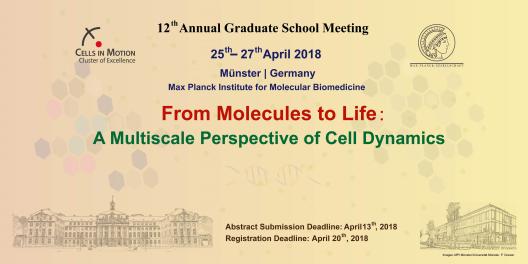
| 09:00 | Registration |
| 13:00 | Opening |
|
Session 1: Cytoskeleton |
|
| 13:15 | Reconstitution of (parts of) cell division Andrea Musacchio, Dortmund - Germany |
| 13:55 | Comparative approach to understanding mitotic division Snezhana Oliferenko, London - UK |
| 14:35 | Coffee break |
|
Session 2: Cell trafficking |
|
| 15:05 | T-/B-cell interaction promoting CNS autoimmunity Alexander Flügel, Göttingen - Germany |
| 15:45 | VE-cadherin endocytosis regulates cell polarity, collective cell migration, and angiogenesis during development Andrew P. Kowalczyk, Atlanta - USA |
|
Poster Session |
|
| 16:25 | Students will present their projects in form of posters. |
|
Session 3: Ion channels |
|
| 17:25 | Open Sesame...Close Sesame: Ion Channels - Key to stomatal gating Kavitha Sankaranarayanan, Chennai - India |
| 18:05 | Structure and Biology of NMDA receptors Hiro Furukawa, New York - USA |
|
Evening Program |
|
| 18:45 | Dinner and social event |
|
Session 4: Biomechanics |
|
| 09:20 | Cell mechanoadaptation and tissue stiffening in health and disease Miguel Ángel del Pozo, Madrid - Spain |
| 10:00 | Structural organisation, liquid disorder, jamming, and glassy dynamics in king penguin colonies Ben Fabry, Erlangen - Germany |
| 10:40 | Real-time deformability cytometry: Mechanical phenotyping for translational applications Fabian Czerwinski, Greifswald - Germany |
| 11:20 | Coffee break |
|
Session 5: Biochemistry |
|
| 11:50 | Protein TAILS Tell Remarkable Tales: Proteomic Untangling of the Protease Web in Immunity Christopher Overall, Vancouver - Canada |
| 12:30 | Circadian rhythms in immune cell trafficking and function Christoph Scheiermann, Munich - Germany |
|
Session 6: Chemistry |
|
| 14:10 | Allosteric inhibitors of flaviviral NS3/NS2B proteases Tanja Schirmeister, Mainz - Germany |
| 14:50 | The molecular dynamics of potassium channel permeation, selectivity and gating Bert de Groot, Göttingen - Germany |
| 15:30 | Young investigator talk Imtiaz Ali |
|
Poster Session |
|
| 15:50 | Students will present their projects in form of posters. |
|
Session 7: RNA and DNA biology |
|
| 16:50 | Simulating chromatin Modesto Orozco, Barcelona - Spain |
| 17:30 | Sensing the environment through tRNA modifications: T. brucei dynamically alters Queuosine levels in response to nutrient changes Juan Alfonzo, Columbus - USA |
| 18:10 | Young investigator talk Sergiy Velychko |
|
Evening Program |
|
| 18:30 | City tour and dinner (for speakers only) |
|
Session 8: Imaging |
|
| 09:00 | Collective cancer cell invasion: plasticity and interconversions Peter Friedl, Nijmegen - The Netherlands |
| 10:00 | Endocytic control of mechanics, collective motion and cancer progression Giorgio Scita, Milan - Italy |
| 10:40 | Coffee break |
|
Session 9: Imaging |
|
| 11:10 | Actin regulation in healthy and diseased brain Pirta Hotulainen, Helsinki - Finland |
|
Closing Ceremony |
|
| 11:50 | Closing remarks and poster awards |
|
Career Talks & Workshop |
|
| 13:20 | Career talk |
| 14:30 | Workshop: Huygens post-processing: the fastest road to TRUE analysis of your microscopic data |
| 16:30 | End |
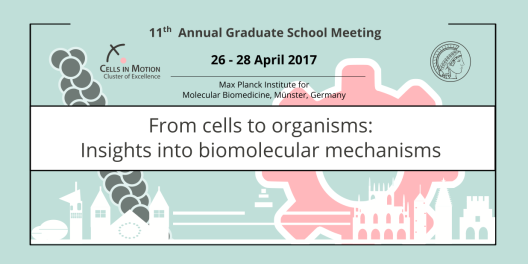
| 10:00 | Registration |
| 12:00 | Lunch (for speakers only) |
| 12:45 | Opening remarks |
|
Session 1: Vasculature |
|
| 13:00 | Endothelial cells in motion Holger Gerhardt, Berlin - Germany |
| 13:40 | Vascular malformations: From human genetic mosaicism towards clinical trials Miikka Vikkula, Brussels - Belgium |
| 14:20 | Cell mechanoadaptation: Caveolae mechanobiology and tissue biomechanics Miguel Ángel del Pozo Barriuso, Madrid - Spain |
| 15:00 | Coffee break |
|
Session 2: Physiology |
|
| 15:30 | How to use atomic-scale manipulations to study function & pharmacology of ion channels Stephan Pless, Copenhagen - Denmark |
| 16:10 | The Quantum Robin: Magnetoreception in migratory birds Henrik Mouritsen, Oldenburg - Germany |
| 16:50 | Optical control of synaptic signaling proteins: Photoswitchable ligands to study the function of glutamate receptors Andreas Reiner, Bochum - Germany |
|
Evening Program |
|
| 18:45 | City tour and dinner (for speakers only) |
|
Session 3: Imaging and Detection Tools |
|
| 09:00 | Labeling proteins on-demand with fl uorogenic probes Arnaud Gautier, Paris - France |
| 09:40 | Bioelectronics: Building connections between DNA, proteins, neurons and electronics Andreas Offenhäusser, Jülich - Germany |
| 10:20 | Molecular tracers for neuroinfl ammation: From synthesis to animal imaging Andrew Sutherland, Glasgow - UK |
| 11:00 | Coffee break |
|
Session 4: Cell Migration |
|
| 11:30 | Dynamic interplay between mitochondria, ER and actin filaments during mitochondrial fission Henry Higgs, Dartmouth - USA |
| 12:10 | Rho GTPases: signalling in cell adhesion and migration Anne Ridley, London - UK |
| 12:50 | Studying the mechanics and molecules underlying in vivo tissue invasion Daria Siekhaus, Klosterneuburg - Austria |
| 13:30 | Lunch (for speakers only) |
|
Session 5: Biophysics |
|
| 14:30 | Synthetic morphogenesis in naïve embryonic tissues Stefano De Renzis, Heidelberg - Germany |
| 15:10 | A new perspective on nanoscale structure and dynamics with ultrasensitive optical microscopy Philipp Kukura, Oxford - UK |
| 15:50 | From ancient lipids to synthetic life James Sáenz, Dresden - Germany |
|
Poster Session |
|
| 16:45 | Students present their projects in a form of poster. |
|
Evening Program |
|
| 18:30 | Dinner |
| 19:30 | Social event |
|
Session 6: Dynamics of the Cytoskeleton |
|
| 09:30 | Forces controlling endothelial adhesion dynamics within the vasculature Stephan Huveneers, Amsterdam - Netherlands |
| 10:10 | Cellular level chemotaxis and haptotaxis Nikolaos Sfakianakis, Mainz - Germany |
| 10:50 | Molecular mechanisms for making tubes: anisotropies and cytoskeletal crosstalk Katja Röper, Cambridge - UK |
| 11:30 | Lunch (for speakers only) |
|
Career Talks |
|
| 12:30 | The industrial path: Insights into industrial careers |
| 13:00 | The academical path: overview of grant application procedures and the career path |
|
Closing Remarks |
|
| 13:30 | Closing remarks and poster awards |
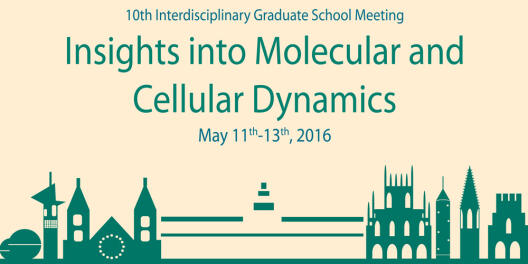
| 9:00 | Registration |
| 10:45 | Welcome Remarks |
|
Session 1: Immunology |
|
| 11:00 | NETs - the second function of chromatin Arturo Zychlinsky (Max Planck Institute for Infection Biology) |
| 11:30 | Retroviruses, envelopes, receptors and metabolic markers Marc Sitbon (The Institute of Molecular Genetics of Montpellier) |
| 12:00 | Mammalian sterile 20-like kinase 1: an important player for neutrophil transmigration Markus Sperandio (Ludwig-Maximilians-Universität Munich) |
| 12:30 | Lunch |
|
Session 2: Cell Biology |
|
| 14:00 | Establishing new tools for manipulating alternative model organisms in the study of the evolution of developmental processes Cassandra G. Extavour (Department of Molecular and Cellular Biology, Harvard University) |
| 14:30 | Extracellular matrix and its role in biomedical research Katja Schenke-Layland (Fraunhofer Institute for Interfacial Engineering and Biotechnology) |
| 15:00 | Deconstructing cell migration Matthieu Piel (Institut Curie) |
| 15:30 | Innate immune cell dynamics at sites of inflammation and infection Tim Lämmermann (Max Planck Institute of Immunobiology and Epigenetics) |
| 16:00 | Coffee break |
|
Session 3: Young Scientist Talks |
|
| 16:30 | Wound-induced signals and positional cues cooperate to initiate regeneration in the planarian s. mediterranea Suthira Owlarn (Münster, Germany) |
| 16:50 | Regulation of bone vascularization and osteogenesis during mouse development Urs H. Langen (Münster, Germany) |
| 17:10 | A nanotechnological approach reveals the role of alpha 2 beta 1 integrin in collagen-induced platelet aggregation Augusto Martins Lima (Münster, Germany) |
| 17:30 | Plasma membrane organization in zebrafish primordial germ cells (PGCs) bleb Mohammad Goudarzi (Münster, Germany) |
|
Evening Program |
|
| 18:30 | Guided City Tour |
| 19:30 | Dinner |
|
Session 4: Developmental Biology |
|
| 09:00 | Regeneration of hematopoietic stem cells from endothelial cells Dhvanit Shah (Harvard Medical School) |
| 09:30 | Notch regulates BMP responsiveness and lateral branching in vessel networks via SMAD6 Victoria L. Bautch (University of North Carolina at Chapel Hill) |
| 10:00 | Molecular regulation of endothelial barrier properties in the central nervous system Stefan Liebner (Goethe University Frankfurt) |
| 10:30 | CNS neuronal progenitors regulate vascular patterning in adjacent mesodermal tissues Didier Stainier (Max Planck Institute for Heart and Lung Research) |
| 11:00 | Coffee break |
|
Keynote lecture |
|
| 11:30 | The development of colour patterns in fishes - Towards an understanding of the evolution of beauty Christiane Nüsslein-Volhard (Max Planck Institute for Developmental Biology) |
| 12:30 | Lunch |
|
Session 5: Applied Mathematics |
|
| 14:00 | Aspects of cell swimming motility Eamonn Gaffney (University of Oxford) |
| 14:30 | Mathematical modeling of mechano-chemical pattern formation Anna Marciniak-Czochra (University of Heidelberg) |
| 15:00 | Identification of mammary stem cells and their dynamics during branching morphogenesis Edouard Hannezo (University of Cambridge) |
| 15:30 | Coffee break |
|
Poster Session |
|
| 16:00 | to 18:00 |
|
Evening Program |
|
| 18:30 | Dinner |
| 19:30 | Party |
|
Session 6: Genomics and Systems Biology |
|
| 09:00 | Towards a true isoform biology: deep long read sequencing reveals molecular co-association of distant splicing events in the human brain Hagen Tilgner (Stanford University) |
| 09:30 | Epigenomic establishment of macrophage tolerance and trained immunity Henk Stunnenberg (Radboud Institute for Molecular Life Sciences) |
| 10:00 | Establishment and maintenance of mammalian heterochromatin Thomas Jenuwein (Max Planck Institute of Immunobiology and Epigenetics) |
| 10:30 | Coffee break |
|
Session 7: Drug Design |
|
| 11:00 | Controlling biological activity with photopharmacology Dirk Trauner (Ludwig-Maximilians-Universität Munich) |
| 11:30 | Tools to probe the epigenetic code Manfred Jung (University of Freiburg) |
| 12:00 | Highly selective JAK3-inhibitors with a covalent-reversible binding mode targeting a nitrile induced arginine pocket Stefan Laufer (University of Tübingen) |
| 12:30 | Lunch |
|
Session 8: Neuroscience |
|
| 14:00 | Large protein and nanoparticle transport across the blood-brain barrier (BBB),with implications for drug delivery N. Joan Abbott (King's College London) |
| 14:30 | Glial glycogen and brain energy metabolism: new insights Bruce R. Ransom (University of Washington) |
| 15:00 | The interaction of genes and epigenes – A chromatin loop conferring an increased risk to develop Alzheimer’s disease Johannes Gräff (École polytechnique fédérale de Lausanne) |
|
Fare-Well |
|
| 15:30 | Closing remarks and poster prize |